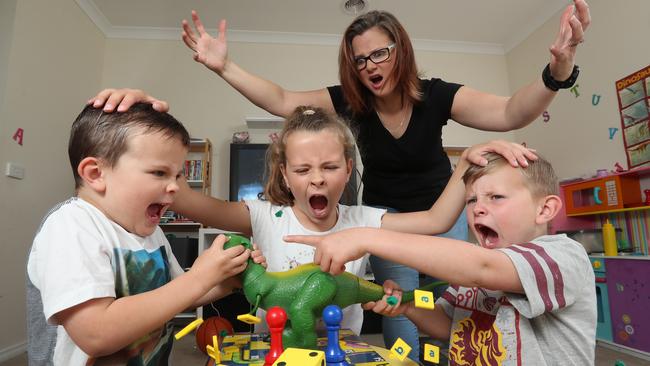Why you should let your kids sort out their own arguments
EXPERTS say it’s healthy for siblings to bicker every once in a while and not all fights should be perceived as “bad”. Here are the times you should leave your kids to sort it out themselves and why.

VIC News
Don't miss out on the headlines from VIC News. Followed categories will be added to My News.
PARENTS should encourage their fighting children to resolve the conflict themselves rather than intervening, experts have advised.
Children who overcame sibling arguments without the help of mum or dad were more likely to develop better problem solving skills, than the kids who relied on parent intervention.
Raising Children Network executive director, Dr Julie Green told the Sunday Herald Sun while parents might be tempted to mediate sibling arguments, it was best to sit back and let the kids work it out for themselves.
READ MORE:
PARENTS QUESTION ANSWERED ON WEBSITE FOR MUMS AND DADS
ADVICE AND TIPS: HOW TO HANDLE RAISING BOYS
BOREDOM FUELS CREATIVITY AND PROBLEM-SOLVING IN KIDS
“Kids grow up with understanding parental authority, but sometimes you have to let them work through fights on their own and it does help with developing life skills,” Dr Green said.
“But parents must know when to step in — if there’s name calling, general nastiness, or anything physical, than you should intervene.”

“It is important to teach your kids about disagreeing respectfully and treating one another with respect.”
Mother Katrina Volkerts said her three children generally had small tiffs with one another every day, whereas major arguments exploded about once a week.
“They get along pretty well, but when they do fight it’s over games or personal space,” she said.
Ms Volkerts encouraged her children to work out issues independently, before stepping in as ‘mum the mediator.’
“I leave them to their own devices to a point and if it’s not sorted out, I walk in and intervene.”
RELATED CONTENT:
10 TYPES OF PARENTS ALL TEACHERS HAVE TO DEAL WITH
OPINION: PARENTING WITHOUT MY VILLAGE TAUGHT ME WHAT I HAVE
“I tell them to listen to one another and then maybe they will find a solution.”
But Dr Green said it was healthy for siblings to bicker every once in a while and not all fights should be perceived as “bad”.
“Fights and resolving conflicts teaches them how to get on with their peers, to share and take turns, so it’s not all bad.”
Other tips for managing sibling conflict included setting family rules on what is considered ‘acceptable’ and ‘unacceptable’ behaviour and punishments for breaking the rules.
Punishments included taking away favourite toys or privileges such as attending activities.
“Parents should stick to a discipline routine and ensure they keep consistent on how they handle disagreements,” Dr Green said.
“Family rules are a great place to come back to.”
WHAT TO DO AFTER A SCUFFLE
WAIT until tempers have cooled and children are ready to reason.
ADVISE them what you plan to do. For example: “I’ve decided that neither of you should use the computer until we can find a way to stop the fighting. Are you willing to work on solving the problem now?”
ASK both children to say what they think the problem is. Encourage them to try to see it from the other person’s point of view.
ASK both children to say what they want to happen and to think about their expectations. For example: “Tegan, is it fair for you to have the computer all the time?”
BRAINSTORM together. Encourage children to come up with ideas on how to solve the problem. Throw in some ideas of your own and write them all down.
RATE the ideas. Start by asking the children to think of which won’t work. Then look for the solution with the least drawbacks.
RETURN If you can’t come up with a solution at first, come back later. You can ask the children to go away and work out some ideas together, or ask other people who have had similar problems.
ONCE you’ve all agreed on an approach, try the solution and see how it goes. Start again if things don’t improve.
Source: raisingchildren.net.au


